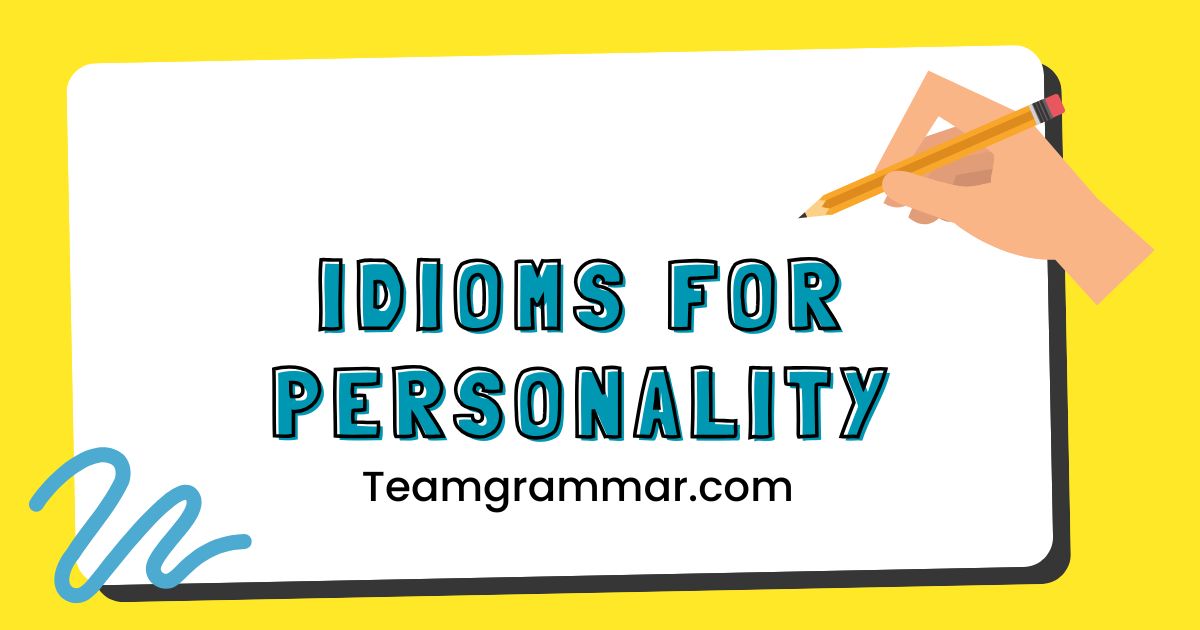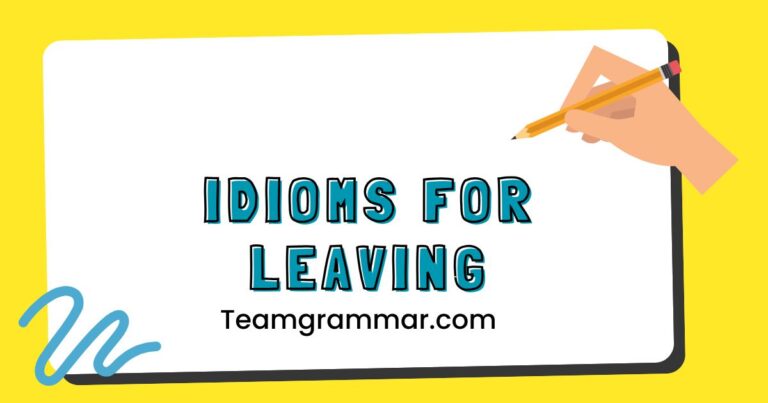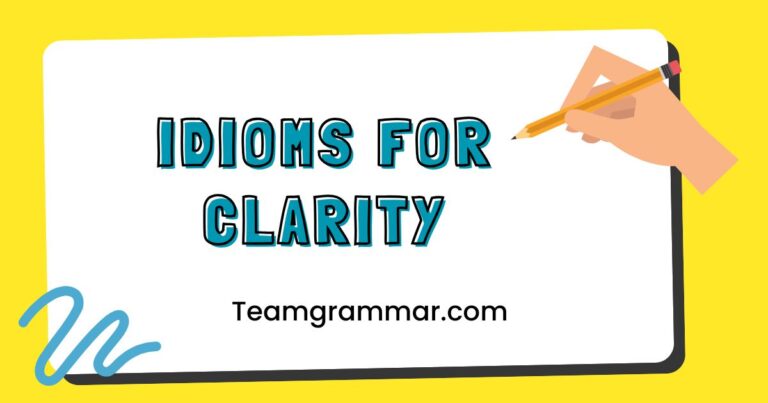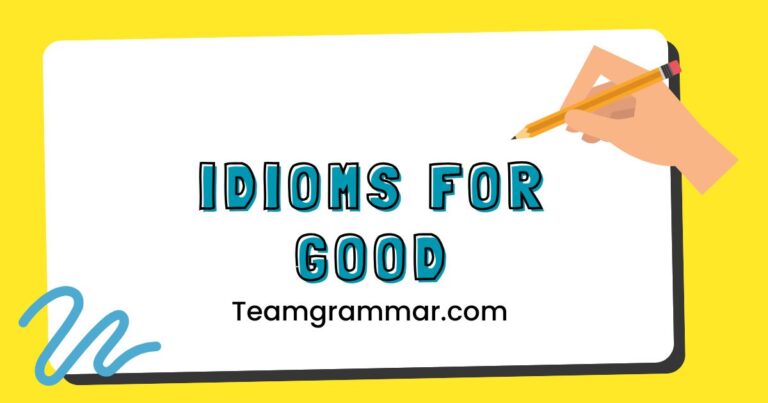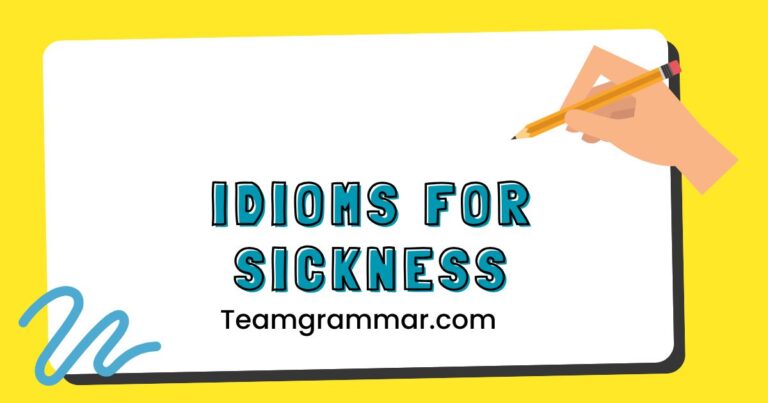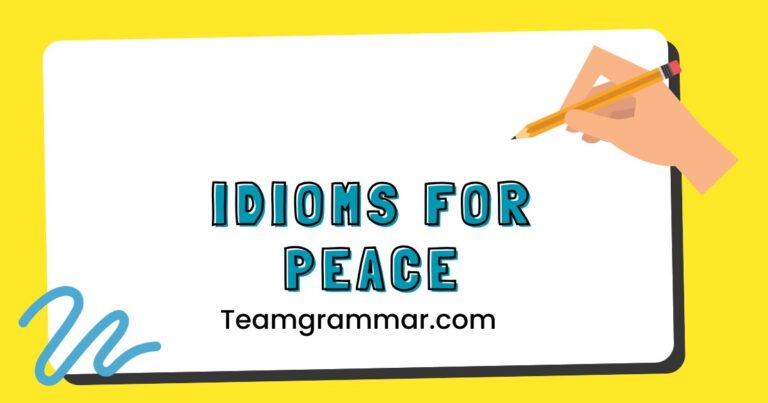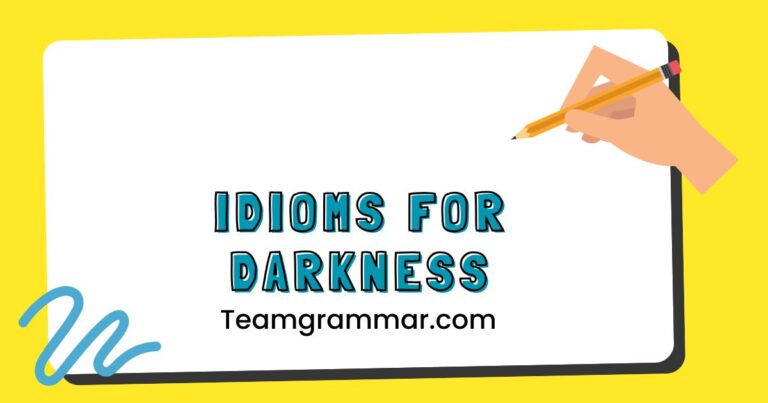37+ Idioms for Personality: Describing People Effectively
Understanding and using idioms to describe personality traits is a crucial skill for any English language learner. Idioms add color and depth to communication, allowing for more nuanced and engaging descriptions of people.
This article provides a comprehensive guide to common idioms used to describe personality, helping you to enhance your vocabulary and speak more fluently and expressively. Whether you’re a student, a professional, or simply someone looking to improve their English, this guide will equip you with the tools to describe personalities with accuracy and flair.
Mastering these idioms will not only improve your comprehension of English but also make your conversations more interesting and relatable.
This guide is designed for English language learners of all levels, from intermediate to advanced, who want to enrich their vocabulary and express themselves more vividly. By the end of this article, you’ll be able to confidently use a variety of idioms to describe different personality types, enhancing both your spoken and written English.
Table of Contents
- Definition of Idioms for Personality
- Structural Breakdown of Personality Idioms
- Types and Categories of Personality Idioms
- Examples of Idioms for Personality
- Usage Rules for Personality Idioms
- Common Mistakes When Using Personality Idioms
- Practice Exercises
- Advanced Topics in Personality Idioms
- Frequently Asked Questions
- Conclusion
Definition of Idioms for Personality
An idiom is a phrase or expression whose meaning cannot be understood from the ordinary meanings of the individual words. Instead, the phrase has a figurative meaning that is known through common use.
Idioms for personality are specific phrases that describe character traits, behaviors, or general disposition of an individual. These idioms provide a more vivid and engaging way to depict someone’s personality compared to using simple adjectives.
Understanding these idioms is essential for comprehending nuanced conversations and literature in English.
Idioms related to personality serve a crucial function in English communication. They allow speakers and writers to convey complex personality traits in a concise and memorable way.
For example, instead of saying someone is “very generous,” you might say they “have a heart of gold.” This not only saves words but also adds a layer of emotional depth to the description. The context in which these idioms are used is vital; the same idiom can have slightly different connotations depending on the situation and the tone of the speaker.
These idioms are classified based on the personality traits they describe. They can be grouped into categories such as positive traits (e.g.,a ray of sunshine), negative traits (e.g.,a wet blanket), and neutral traits (e.g.,a creature of habit).
Furthermore, idioms can also be classified by their structural type, such as metaphorical idioms (e.g.,a diamond in the rough) and phrasal verb idioms (e.g.,to wear your heart on your sleeve). Recognizing these classifications can help learners better understand and use idioms effectively.
Structural Breakdown of Personality Idioms
Understanding the structure of personality idioms can help learners grasp their meaning and usage more effectively. Many idioms are metaphorical, using figurative language to represent a specific personality trait.
Others are based on everyday experiences or cultural references. The structural elements of these idioms typically involve nouns, verbs, adjectives, and prepositions combined in unique ways.
One common structure involves comparing a person to an object or animal to highlight a particular trait. For instance, “as cool as a cucumber” uses the noun ‘cucumber’ to describe someone who is calm and composed.
Another structure involves using verbs to describe typical behaviors associated with a personality type, such as “to wear your heart on your sleeve,” where the verb ‘wear’ signifies openly displaying emotions. The patterns in these idioms often rely on cultural understandings and shared experiences, making them both colorful and concise.
The grammatical structure of idioms can vary widely. Some idioms are simple phrases, while others are more complex clauses.
For example, “a people person” is a simple noun phrase, whereas “to march to the beat of your own drum” is a more complex verb phrase. The key to understanding these structures is to recognize that the meaning is not literal.
Instead, the words combine to create a figurative meaning that is specific to the idiom. Recognizing these patterns will allow you to understand new idioms more quickly and use them appropriately.
Types and Categories of Personality Idioms
Personality idioms can be categorized based on the type of trait they describe. The most common categories include idioms for positive personality traits, negative personality traits, and neutral personality traits.
Each category encompasses a wide range of idioms that provide a colorful and nuanced way to describe individuals.
Idioms for Positive Personality Traits
These idioms describe admirable qualities such as kindness, intelligence, and courage. They are used to express appreciation and admiration for someone’s character.
Examples include “a heart of gold,” “a bright spark,” and “brave as a lion.” These idioms often use positive imagery and metaphors to convey the positive nature of the trait.
Idioms for Negative Personality Traits
These idioms describe undesirable qualities such as selfishness, dishonesty, and laziness. They are used to express disapproval or criticism.
Examples include “a wet blanket,” “a snake in the grass,” and “couch potato.” These idioms often use negative imagery and metaphors to convey the negative nature of the trait.
Idioms for Neutral Personality Traits
These idioms describe qualities that are neither particularly positive nor negative, such as being eccentric, introverted, or predictable. They are used to describe someone’s personality without necessarily passing judgment.
Examples include “a creature of habit,” “a lone wolf,” and “an oddball.” These idioms often use descriptive language that simply highlights a particular aspect of someone’s personality.
Examples of Idioms for Personality
To fully understand personality idioms, it’s essential to see them in context. The following tables provide extensive examples of idioms categorized by positive, negative, and neutral traits.
Each example is accompanied by a definition and a sentence demonstrating its usage.
Positive Personality Traits
The following table provides examples of idioms used to describe positive personality traits. These idioms can help you express admiration and appreciation for someone’s character in a vivid and engaging way.
| Idiom | Definition | Example Sentence |
|---|---|---|
| A heart of gold | A kind and generous person. | She always helps others; she has a heart of gold. |
| A bright spark | An intelligent and quick-witted person. | He’s a bright spark; he always comes up with innovative solutions. |
| Brave as a lion | Very courageous and fearless. | She faced her fears and spoke out; she was brave as a lion. |
| A ray of sunshine | A cheerful and optimistic person. | Her positive attitude makes her a ray of sunshine in the office. |
| Salt of the earth | A person of admirable integrity and dependability. | He’s the salt of the earth; you can always count on him. |
| Good as gold | Well-behaved and obedient. | The children were as good as gold during the long car ride. |
| A true gem | A person who is highly valued and appreciated. | She’s a true gem; we’re lucky to have her on our team. |
| Full of beans | Lively and energetic. | The kids were full of beans after their nap. |
| A stand-up guy | An honest and honorable man. | He’s a stand-up guy; he always keeps his promises. |
| A real trooper | Someone who perseveres through difficulties. | Despite the challenges, she was a real trooper and finished the race. |
| The life of the party | Someone who is fun and makes social gatherings lively. | John is always the life of the party with his jokes and stories. |
| A shoulder to cry on | Someone who offers comfort and support. | Whenever I’m upset, she’s always a shoulder to cry on. |
| A whiz | Someone who is very skilled or knowledgeable. | He’s a math whiz; he can solve complex equations in seconds. |
| A natural | Someone who has an innate talent or ability. | She’s a natural singer; she didn’t even need lessons. |
| A team player | Someone who works well with others. | He’s a great team player and always contributes to the group’s success. |
| A go-getter | Someone who is ambitious and motivated. | She’s a go-getter and always strives to achieve her goals. |
| A people person | Someone who enjoys and is good at interacting with people. | She’s a people person and excels in customer service roles. |
| A breath of fresh air | Someone who brings new ideas or energy. | His innovative ideas were a breath of fresh air to the company. |
| A diamond in the rough | Someone with potential but lacking refinement. | He’s a diamond in the rough; with some training, he’ll be amazing. |
| An eager beaver | Someone who is enthusiastic and hardworking. | She’s an eager beaver and always volunteers for extra tasks. |
| Sharp as a tack | Very intelligent and quick-witted. | He’s sharp as a tack; he understands complex concepts easily. |
| Has a big heart | A kind and compassionate person. | She has a big heart and always looks out for others in need. |
| Always there for you | Reliable and supportive in times of need. | He’s always there for you, no matter what. |
| A true friend | Loyal and supportive. | She’s a true friend and has always stood by me. |
| A constant inspiration | Someone who motivates and encourages others. | Her dedication is a constant inspiration to everyone in the team. |
| Always sees the best in people | Optimistic and positive about others. | He always sees the best in people, even when they make mistakes. |
Negative Personality Traits
The following table provides examples of idioms used to describe negative personality traits. These idioms can help you express disapproval or criticism, but should be used with caution and sensitivity.
| Idiom | Definition | Example Sentence |
|---|---|---|
| A wet blanket | Someone who spoils the fun or enthusiasm of others. | He’s such a wet blanket; he always complains and brings down the mood. |
| A snake in the grass | A treacherous and deceitful person. | Be careful of him; he’s a snake in the grass and will betray you. |
| Couch potato | A lazy person who spends a lot of time sitting and watching television. | He’s become a couch potato since he retired. |
| A pain in the neck | Someone who is annoying or troublesome. | Dealing with his constant complaints is a pain in the neck. |
| A control freak | Someone who tries to control everything and everyone. | She’s a control freak and has to micromanage every detail. |
| A drama queen | Someone who exaggerates their emotions and reactions. | She’s such a drama queen; she always makes a big deal out of everything. |
| A know-it-all | Someone who acts as if they know everything. | He’s a know-it-all and always interrupts to correct others. |
| A busybody | Someone who interferes in other people’s affairs. | She’s a busybody and always asks too many personal questions. |
| A Scrooge | A miserly person who hates spending money. | He’s a Scrooge and never wants to contribute to group expenses. |
| A backstabber | Someone who betrays others behind their back. | She’s a backstabber and will spread rumors about you. |
| A downer | Someone who is pessimistic and brings others down. | He’s such a downer; he always focuses on the negative. |
| A gossipmonger | Someone who spreads rumors and gossip. | She’s a gossipmonger and loves to share scandalous stories. |
| A mooch | Someone who takes advantage of others. | He’s a mooch and always asks for favors without returning them. |
| A complainer | Someone who constantly complains about everything. | She’s a complainer and never has anything positive to say. |
| A slacker | Someone who avoids work or effort. | He’s a slacker and always tries to get out of doing his share. |
| A hothead | Someone who gets angry easily. | He’s a hothead and often loses his temper over small things. |
| A cheapskate | Someone who is unwilling to spend money. | He’s such a cheapskate that he never offers to pay. |
| A show-off | Someone who likes to boast about their abilities. | He’s a show-off and always brags about his achievements. |
| A bad egg | Someone who is dishonest or unreliable. | He’s a bad egg; I wouldn’t trust him with anything. |
| A wolf in sheep’s clothing | Someone who appears harmless but is actually dangerous. | He’s a wolf in sheep’s clothing; don’t be fooled by his charm. |
| A killjoy | Someone who spoils the fun for others. | He’s such a killjoy; he always finds something to complain about at parties. |
| A troublemaker | Someone who causes problems or difficulties. | She’s a troublemaker and always stirs up drama. |
| A nitpicker | Someone who focuses on minor details and finds fault in everything. | He’s a nitpicker and always points out small errors. |
| A blabbermouth | Someone who talks too much and reveals secrets. | She’s a blabbermouth and can’t be trusted with confidential information. |
| A backseat driver | Someone who gives unwanted advice or criticism. | He’s a backseat driver and always tells me how to do things. |
| A fuddy-duddy | Someone who is old-fashioned and resistant to change. | He’s a fuddy-duddy and doesn’t understand modern technology. |
Neutral Personality Traits
The following table provides examples of idioms used to describe neutral personality traits. These idioms describe qualities that are neither particularly positive nor negative, and can be used to provide a balanced description of someone’s personality.
| Idiom | Definition | Example Sentence |
|---|---|---|
| A creature of habit | Someone who follows a routine and dislikes change. | He’s a creature of habit and always has the same breakfast. |
| A lone wolf | Someone who prefers to be alone and independent. | She’s a lone wolf and prefers to work independently. |
| An oddball | Someone who is eccentric or unconventional. | He’s a bit of an oddball, but he’s a brilliant artist. |
| A rolling stone | Someone who doesn’t settle down in one place or job. | He’s a rolling stone and has lived in many different countries. |
| A chatterbox | Someone who talks a lot. | She’s a chatterbox and can talk for hours. |
| A homebody | Someone who enjoys spending time at home. | He’s a homebody and prefers quiet evenings to going out. |
| A daydreamer | Someone who spends time imagining things. | She’s a daydreamer and often gets lost in her thoughts. |
| A night owl | Someone who stays up late at night. | He’s a night owl and does his best work in the evening. |
| An early bird | Someone who wakes up early in the morning. | She’s an early bird and likes to start her day before sunrise. |
| A bookworm | Someone who loves reading books. | He’s a bookworm and spends all his free time reading. |
| A social butterfly | Someone who is very social and outgoing. | She’s a social butterfly and knows everyone at the party. |
| A workaholic | Someone who is addicted to working. | He’s a workaholic and spends most of his time at the office. |
| A penny-pincher | Someone who is careful with money. | She’s a penny-pincher and always looks for the best deals. |
| A spendthrift | Someone who spends money extravagantly. | He’s a spendthrift and often buys things he doesn’t need. |
| A minimalist | Someone who prefers simplicity and avoids excess. | She’s a minimalist and only owns what she truly needs. |
| A maximalist | Someone who enjoys surrounding themselves with many things. | He’s a maximalist and his home is filled with art and collectibles. |
| A free spirit | Someone who is independent and unconventional. | She’s a free spirit and travels the world without a plan. |
| A wallflower | Someone who is shy and stays on the sidelines. | He’s a wallflower and prefers to observe from a distance. |
| A yes-man | Someone who always agrees with their superiors. | He’s a yes-man and never challenges the boss’s decisions. |
| A people pleaser | Someone who tries to make everyone happy. | She’s a people pleaser and always puts others’ needs first. |
| A deep thinker | Someone who ponders complex ideas and concepts. | He’s a deep thinker; he’s always contemplating philosophical questions. |
| A trendsetter | Someone who starts new trends and influences others. | She’s a trendsetter; everyone copies her style. |
| A follower | Someone who follows trends and others’ lead. | He’s a follower; he always does what’s popular. |
| A straight shooter | Someone who is honest and direct. | He’s a straight shooter; you can always count on him for the truth. |
| A glass-half-full person | An optimist who always sees the positive side of things. | She’s a glass-half-full person and always looks on the bright side. |
Usage Rules for Personality Idioms
Using personality idioms correctly involves understanding their specific meanings and contexts. It’s important to consider the tone and the relationship with the person you’re describing.
Some idioms are more informal and suitable for casual conversations, while others are more formal and appropriate for professional settings. Additionally, some idioms can be offensive if used inappropriately.
One key rule is to ensure that the idiom aligns with the overall message you’re trying to convey. For instance, if you’re praising someone for their generosity, using the idiom “a heart of gold” would be appropriate.
However, using a negative idiom like “a Scrooge” would be contradictory. Also, be mindful of cultural differences; some idioms may not translate well or have the same connotations in different cultures.
It’s also important to avoid overusing idioms. While they can add color and depth to your language, using too many idioms in a short space can make your speech sound unnatural and forced.
Instead, use idioms sparingly and strategically to highlight specific personality traits or behaviors. Practice using idioms in different contexts to become more comfortable and confident in their usage.
Common Mistakes When Using Personality Idioms
One of the most common mistakes is misinterpreting the meaning of an idiom. Since idioms have figurative meanings, it’s easy to misunderstand their intended message.
For example, someone might think “a wet blanket” refers to someone who is literally wet, rather than someone who spoils the fun.
Another common mistake is using idioms in the wrong context. Some idioms are only appropriate for certain situations or relationships.
Using an informal idiom in a formal setting, or using an offensive idiom without realizing its implications, can lead to misunderstandings and offense. It’s important to be aware of the social and cultural context in which you’re using idioms.
A further mistake is using idioms incorrectly in a sentence. Idioms often have specific grammatical structures that must be followed.
For example, the idiom is “wear your heart on your sleeve”, not “wear your heart in your sleeve”. Altering the structure of an idiom can change its meaning or make it nonsensical.
Here are some examples of incorrect and correct usage:
| Incorrect | Correct |
|---|---|
| He has a gold of heart. | He has a heart of gold. |
| She is as brave than a lion. | She is as brave as a lion. |
| He is the blanket wet. | He is a wet blanket. |
| She is a snake on the grass. | She is a snake in the grass. |
| He is a potato couch. | He is a couch potato. |
Practice Exercises
Test your understanding of personality idioms with the following exercises. Choose the correct idiom to complete each sentence.
| Question | Answer |
|---|---|
1. She always knows how to make people laugh; she’s the _____.
|
2. the life of the party |
2. He never spends money; he’s such a _____.
|
2. a penny-pincher |
3. You can always rely on her; she has _____.
|
1. a heart of gold |
4. He’s always causing trouble; he’s a real _____.
|
2. a troublemaker |
5. She’s very shy and prefers to stay in the background; she’s a _____.
|
2. a wallflower |
6. He’s always working; he’s a _____.
|
2. a workaholic |
7. She’s very intelligent and quick-witted; she’s a _____.
|
1. a bright spark |
8. He’s always getting into fights; he’s a _____.
|
1. A hothead |
9. She’s always giving people advice that no one asked for; she’s a _____.
|
2. A backseat driver |
10. He’s always saying yes to everything that the boss says; he’s a _____.
|
3. A yes-man |
Exercise 2: Fill in the blanks with the appropriate idiom.
| Question | Answer |
|---|---|
| 1. Even though he makes mistakes, he __________ and always sees the best in people. | always sees the best in people |
| 2. You can always count on him because he is __________ and is always there for you. | always there for you |
| 3. She is __________ and provides comfort when I am feeling down. | a shoulder to cry on |
| 4. He is __________; he always tries to control every single detail. | a control freak |
| 5. She is __________ and makes everything seem like a huge deal. | a drama queen |
| 6. He is __________ and always tries to take advantage of others. | a mooch |
| 7. She is __________ and loves to spread rumors and gossip. | a gossipmonger |
| 8. He’s known for being __________ because he hates change and loves sticking to his routine. | a creature of habit |
| 9. Even though she is shy, she is __________ and loves being around people. | a social butterfly |
| 10. He’s always thinking of new and creative ways to solve problems; he’s __________. | a deep thinker |
Advanced Topics in Personality Idioms
For advanced learners, exploring the etymology and cultural origins of personality idioms can provide a deeper understanding of their meaning and usage. Many idioms have historical roots that reflect societal values and beliefs.
For example, the idiom “salt of the earth” comes from the Bible and refers to people who are honest and reliable, much like salt was valued for its preserving qualities.
Another advanced topic is the use of idioms in literature and rhetoric. Authors often use idioms to create vivid character descriptions and to convey complex themes.
Understanding these idioms can enhance your appreciation of literature and improve your ability to analyze texts critically. Furthermore, mastering personality idioms can make your own writing and speaking more engaging and persuasive.
Finally, exploring regional variations in idiom usage can be a fascinating area of study. Different regions and cultures may have their own unique idioms for describing personality traits.
Learning these variations can broaden your understanding of the English language and improve your ability to communicate effectively with people from diverse backgrounds.
Frequently Asked Questions
- What is an idiom, and why is it important to learn idioms?
An idiom is a phrase or expression whose meaning cannot be understood from the ordinary meanings of the individual words. It’s important to learn idioms because they are commonly used in everyday conversation and literature, and understanding them can significantly improve your comprehension and fluency in English. Additionally, using idioms correctly can make your speech more colorful and engaging.
- How can I effectively learn and memorize personality idioms?
One effective method is to learn idioms in context. Read and listen to English materials, such as books, articles, and conversations, and pay attention to how idioms are used. Keep a notebook of new idioms you encounter, along with their definitions and example sentences. Practice using these idioms in your own speaking and writing to reinforce your understanding.
- Are there any resources for practicing and improving my knowledge of personality idioms?
Yes, there are many resources available. Online dictionaries, such as the Oxford Learner’s Dictionary and Merriam-Webster, often provide definitions and examples of idioms. There are also websites and apps specifically designed for learning idioms, such as “Idioms Land” and “English Idioms Quiz.” Additionally, you can practice with language exchange partners or tutors who can provide feedback on your usage of idioms.
- Can the same idiom have different meanings in different contexts?
Yes, the meaning of an idiom can sometimes vary depending on the context. While the core meaning usually remains the same, the specific nuance or implication can change based on the situation. Pay attention to the surrounding words and the overall tone of the conversation to accurately interpret the meaning of an idiom.
- How do I avoid making mistakes when using personality idioms?
The best way to avoid mistakes is to thoroughly understand the meaning and usage of each idiom before using it. Double-check the definition and example sentences to ensure you’re using the idiom correctly. Be mindful of the context and the relationship with the person you’re describing. If you’re unsure, it’s better to err on the side of caution and use a more straightforward expression.
- Are there any idioms that should be avoided because they are offensive or outdated?
Yes, some idioms can be offensive or outdated and should be avoided. Idioms that rely on stereotypes or discriminatory language can be hurtful and inappropriate. Additionally, some idioms may have fallen out of common usage and may sound strange or out of touch. When in doubt, it’s best to use more contemporary and inclusive language.
- How do I know if an idiom is appropriate for a formal or informal setting?
Consider the tone and the audience. Formal settings, such as business meetings or academic presentations, typically require more professional language. Informal settings, such as conversations with friends or family, allow for more casual expressions. If you’re unsure, it’s better to use more formal language to avoid any potential misunderstandings or offense.
- What are some strategies for remembering the meanings of idioms?
Use mnemonic devices, such as creating mental images or associating idioms with personal experiences. Write down example sentences and review them regularly. Teach the idioms to someone else, as explaining them can reinforce your own understanding. Use flashcards or online quizzes to test your knowledge and track your progress.
- How can I tell the difference between an idiom and a literal expression?
An idiom’s meaning is figurative, while a literal expression means exactly what it says. If the words in a phrase don’t make sense when taken literally, it’s likely an idiom. For example, “kick the bucket” doesn’t literally mean to kick a bucket; it means to die. Pay attention to the context and consider whether the phrase is being used in a figurative or literal sense.

